- Home
- Juliet Marillier
Daughter of the Forest Page 2
Daughter of the Forest Read online
Page 2
As for Padriac, he could turn his hand to anything, but his great love was to examine things and find out how they worked; he would ask questions till it drove you crazy. Padriac was the only one that could break through Father’s guard; sometimes you’d catch the ghost of a smile on Colum’s dour features when he looked at his youngest son. He didn’t smile at me. Or at Finbar. Finbar said that was because we reminded Father of our mother, who had died. We were the two who inherited her curling, wild hair. I had her green eyes, and Finbar her gift of stillness. Besides, by being born, I had killed her. No wonder Father found it hard to look at me. But when he spoke to Finbar his eyes were like winter. There was one time in particular. It was not long before she came, and our lives changed forever. Finbar was fifteen; not yet a man, but most certainly no longer a child.
Father had summoned us, and we were all assembled in the great hall. Finbar stood before Lord Colum’s chair, back straight as a spear, waiting for the ritual inquisition. Liam and Diarmid were young men now, and so were spared this ordeal. But they were present on the sidelines, knowing that this reassured the rest of us.
“Finbar. I have spoken to your instructors.”
Silence. Finbar’s wide gray eyes appeared to look straight through Father’s.
“I’m told your skills are developing well. This pleases me.” Despite these words of praise, Father’s gaze was chill, his tone remote. Liam glanced at Diarmid and Diarmid grimaced back, as if to say, here it comes.
“Your attitude, however, apparently leaves a great deal to be desired. I’m told that you have achieved these results without applying a great deal of effort or interest, and in particular, that you frequently absent yourself from training with no reason.”
Another pause. At this point it would most certainly have been a good idea to say something, just to avoid trouble; “yes, Father” would have been enough. Finbar’s utter stillness was an insult in itself.
“What’s your explanation, boy? And none of your insolent looks, I want an answer!”
Father leaned forward, his face close to Finbar’s, and the expression on his face made me shiver and move nearer to Conor. It was a look to terrify a grown man. “You are of an age now to join your brothers at my side, at least while I remain here; and before long, in the field. But there’s no place for dumb insolence on a campaign. A man must learn to obey without question. Well, speak up! How do you account for this behavior?”
But Finbar wasn’t going to answer. If I have nothing to say to you, I will not speak. I knew the words were in his mind. I clutched Conor’s hand. We had seen Father’s anger before. It would be foolish to invite it.
“Father.” Liam stepped forward diplomatically. “Perhaps—”
“Enough!” Father commanded. “Your brother does not require you to speak for him. He has a tongue, and a mind of his own—let him use both.”
Finbar seemed perfectly composed. Outwardly, he looked quite calm. It was only I, who shared every breath he took, knew his every moment of pain or joy as if it were my own, that felt the tension in him and understood the courage it took for him to speak.
“I will give you an answer,” he said. His tone was quiet. “To learn to handle a horse, and to use sword and bow, that is worthy enough. I would use these skills to defend myself, or my sister, or to aid my brothers in time of peril. But you must spare me your campaigning. I will have none of it.”
My father was incredulous—too taken aback to be angry, yet, but his eyes became glacial. Whatever he had expected, it was not a confrontation of this kind. Liam opened his mouth to speak again, but Father silenced him with a savage look.
“Tell us more,” he invited politely, like a predator encouraging its meal into a honeyed trap. “Can you be so little aware of the threat to our lands, to the very fabric of our life here? You have been instructed on all these matters; you have seen my men return bloodied from battle, have seen the havoc these Britons wreak on lives and land. Your own brothers think it honorable work to fight alongside their father so the rest of you can enjoy peace and prosperity. They risk their lives to win back our precious Islands, torn from our people by this rabble, long years since. Have you so little faith in their judgment? Where have you learned this ill-conceived rubbish? Campaigning?”
“From the evidence of my own eyes,” said Finbar simply. “While you spend season after season pursuing this perceived enemy across land and sea, your villagers grow sick and die, and there is no master to turn to for help. The unscrupulous exploit the weak. Crops are ill tended, herd and flock neglected. The forest guards us. That is just as well, for you would otherwise have lost home and people to the Finnghaill long since.”
Father drew a deep breath. His men took a pace back. “Please go on,” he said in a voice like death. “You are an expert on the subject of the Norsemen, I see.”
“Perhaps—” Liam said.
“Silence!” It was a roar this time, stopping Liam almost before he got a word out. “This matter is between your brother and me. Out with it, boy! What other aspects of my stewardship have you found fault with, in your great wisdom? Don’t stint, since you are so outspoken!”
“Is that not enough?”
I detected, at last, a touch of unsteadiness in Finbar’s voice. He was after all still just a boy.
“You value the pursuit of a distant enemy before keeping your own house in order. You speak of the Britons as if they were monsters. But are they not men like us?”
“You can hardly dignify such a people with the title of men,” said our father, stung to direct response at last. His voice was harsh with building anger. “They come with evil thoughts and barbarian ways to take what is rightfully ours. Would you see your sister subject to their savagery? Your home overrun by their filth? Your argument shows your ignorance of the facts, and the sorry gaps in your education. What price your fine philosophy when you stand with a naked sword in your hand, and your enemy before you poised to strike? Wake up, boy. There is a real world out there, and the Britons stand in it with the blood of our kinsmen on their hands. It is my duty, and yours, to seek vengeance, and to reclaim what is rightly ours.”
Finbar’s steady gaze had never left Father’s face.
“I am not ignorant of these matters,” he said, still quietly. “Pict and Viking, both have troubled our shores. They have left their mark on our spirits, though they could not destroy us. I acknowledge that. But the Britons, too, suffered the loss of lands and lives from these raids. We do not fully understand their purpose, in taking our islands, in maintaining this feud. We would be better, perhaps, to unite with them against our common enemies. But no: your strategy, like theirs, is to kill and maim without seeking for answers. In time, you will lose your sons as you lost your brothers, in blind pursuit of an ill-defined goal. To win this war, you must talk to your foe. Learn to understand him. If you shut him out, he will always outwit you. There is death and suffering and a long time of regret in your future, if you follow this path. Many will go with you, but I will not be among them.”
His words were strange; his tone chilled me. I knew he spoke the truth.
“I will hear no more of this!” thundered Father, rising to his feet. “You speak like a fool, of matters you cannot comprehend. I shudder to think a son of mine could be so ill-informed, and so presumptuous. Liam!”
“Yes, Father?”
“I want this brother of yours equipped to ride with us when next we travel north. See to it. He expresses a wish to understand the enemy. Perhaps he will do so when he witnesses the shedding of blood at firsthand.”
“Yes, Father.” Liam’s expression and tone were well-schooled to neutrality. His glance at Finbar, though, was sympathetic. He simply made sure Father wasn’t looking.
“And now, where is my daughter?”
Stepping forward reluctantly, I passed Finbar and brushed his hand with mine. His eyes were fierce in a face bleached of color. I stood before Father, torn with feelings I hardly understood. Wasn’t a
father meant to love his children? Didn’t he know how much courage it had taken, for Finbar to speak out this way? Finbar saw things in a way the rest of us never could. Father should have known that, for people said our mother had possessed the same gift. If he’d bothered to take the time, he would have known. Finbar could see ahead, and offer warnings that were ignored at your own peril. It was a rare skill, dangerous and burdensome. Some called it the Sight.
“Come forward, Sorcha.”
I was angry with Father. And yet, I wanted him to recognize me. I wanted his praise. Despite everything, I could not shut off the wish deep inside me. My brothers loved me. Why couldn’t Father? That was what I was thinking as I looked up at him. From his viewpoint I must have been a pathetic little figure, skinny and untidy, my curls falling over my eyes in disarray.
“Where are your shoes, child?” asked Father wearily. He was getting restless.
“I need no shoes, Father,” I said, hardly thinking. “My feet are tough, look,” and I raised one narrow, grubby foot to show him. “No need for some creature to die so I can be shod.” This argument had been used on my brothers till they tired of it and let me run barefoot if it suited me.
“Which servant has charge of this child?” snapped Father testily. “She is no longer of an age to be let loose like some—some tinker’s urchin. How old are you, Sorcha—nine, ten?”
How could he not know? Didn’t my birth coincide with his loss of all he held most dear in the world? For my mother had died on midwinter day, when I was not yet a day old, and folk said it was lucky for me Fat Janis, our kitchen woman, had a babe at the breast and milk enough for two, or I’d likely have died as well. It was a measure of Father’s success in closing off that former life, perhaps, that he no longer counted every lonely night, every empty day, since she died.
“I’ll be thirteen on midwinter eve, Father,” I said, standing up as tall as I could. Perhaps if he thought of me grown up enough, he would start to talk to me properly, the way he did to Liam and Diarmid. Or to look at me with that hint of a smile he sometimes turned on Padriac, who was closest to me in age. For an instant, his dark, deep-set eyes met mine, and I stared back with a wide green gaze that, had I but known it, was the image of my mother’s.
“Enough,” he said abruptly, and his tone was dismissive. “Get these children out of here, there’s work to be done.”
Turning his back on us, he was quickly engrossed in some great map they were rolling out on the oak table. Only Liam and Diarmid could expect to stay; they were men now, and privy to my father’s strategies. For the rest of us, it was over. I stepped back out of the light.
Why do I remember this so well? Perhaps his displeasure with what we were becoming made Father take the choice he did, and so bring about a series of events more terrible than any of us could have imagined. Certainly, he used our well-being as one of his excuses for bringing her to Sevenwaters. That there was no logic in this was beside the point—he must have known in his heart that Finbar and I were made of strong stuff, already shaped in mind and spirit, if not quite grown, and that expecting us to bend to another will was like trying to alter the course of the tide, or to stop the forest from growing. But he was influenced by forces he was unable to understand. My mother would have recognized them. I often wondered, later, how much she knew of our future. The Sight does not always show what a person wants to see, but maybe she had an idea as she bade her children farewell, what a strange and crooked path their feet would follow.
As soon as Father dismissed us from the hall, Finbar was gone, a shadow disappearing up the stone steps to the tower. As I turned to follow, Liam winked at me. Fledgling warrior he might be, but he was my brother. And I got a grin from Diarmid, but he wiped his face clean of all expressions but respect as he turned back toward Father.
Padriac would be away off outdoors; he had an injured owl in the stables that he was nursing back to health. It was amazing, he said, how much this task had taught him about the principles of flight. Conor was working with my father’s scribe, helping with some calculations; we wouldn’t be seeing much of him for a while. Cormack would be off to practice with the sword or the staff. I was alone when I padded up the stone steps on my bare feet and into the tower room. From here you could climb up further, onto a stretch of slate roof with a low battlement around it, probably not sufficient to arrest a good fall, but that never stopped us from going up there. It was a place for stories, for secrets; for being alone together in silence.
He was, as I’d expected, sitting on the most precarious slope of the roof, knees drawn up, arms around them, his expression unreadable as he gazed out over the stonewalled pastures, the barns and byres and cottages, to the smoke gray and velvet green and misty blue of the forest. Not so far away the waters of the lake glinted silver. The breeze was quite chill, catching at my skirts as I came up the slates and settled myself down next to him. Finbar was utterly still. I did not need to look at him to read his mood, for I was tuned to this brother’s mind like the bow to the string.
We were quiet for a long time, as the wind tangled our hair, and a flock of gulls passed overhead, calling among themselves. Voices drifted up from time to time, and metal clashed on metal: Father’s men at combat in the yard, and Cormack was among them. Father would be pleased with him.
Slowly, Finbar came back from the far reaches of the mind. His long fingers moved to wind themselves around a strand of his hair.
“What do you know of the lands beyond the water, Sorcha?” he asked quite calmly.
“Not much,” I said, puzzled. “Liam says the maps don’t show everything; there are places even he knows little about. Father says the Britons are to be feared.”
“He fears what he does not understand,” said Finbar. “What about Father Brien and his kind? They came out of the east, by sea, and showed great courage in doing so. In time they were accepted here, and gave us much. Father does not seek to know his foes, or to make sense of what they want. He sees only the threat, the insult, and so he spends his whole life pursuing them, killing and maiming without question. And for what?”
I thought about this for a while.
“But you don’t know them either,” I ventured, logically enough. “And it’s not just Father that thinks they’re a danger. Liam said if the campaigns didn’t go right up to the north, and to the very shore of the eastern sea, we’d be overrun one day and lose everything we have. Maybe not just the islands, but Sevenwaters as well. Then, the old ways would be gone forever. That’s what he says.”
“In a way that’s true,” said Finbar, surprising me. “But there are two sides to every fight. It starts from something small, a chance remark, a gesture made lightly. It grows from there. Both sides can be unjust. Both can be cruel.”
“How do you know?”
Finbar did not reply. His mind was closely shuttered from mine; not for now the meeting of thoughts, the silent exchange of images that passed so often between us, far easier than speech. I thought for a while, but I could think of nothing to say. Finbar chewed the end of his hair, which he wore tied at the nape of the neck, and long. His dark curls, like mine, had a will of their own.
“I think our mother left us something,” he said eventually. “She left a small part of herself in each of us. It’s just as well for them, for Liam and Diarmid, that they have that. It stops them from growing like him.”
I knew what he meant, without fully understanding his words.
“Liam’s a leader,” Finbar went on, “like Father, but not quite like. Liam has balance. He knows how to weigh up a problem evenly. Men would die for him. One day they probably will. Diarmid’s different. People would follow him to the ends of the earth, just for the fun of it.”
I thought about this; pictured Liam standing up for me against Father, Diarmid teaching me how to catch frogs, and to let them go.
“Cormack’s a warrior,” I ventured. “But generous. Kind.” There was the dog, after all. One of the wolfhounds had had a m
isalliance, and given birth to crossbred pups; Father would have had them all drowned, but Cormack rescued one and kept her, a skinny brindled thing he called Linn. His kindness was rewarded by the deep, unquestioning devotion only a faithful dog can give. “And then there’s Padriac.”
Finbar leaned back against the slates and closed his eyes.
“Padriac will go far,” he said. “He’ll go farther than any of us.”
“Conor’s different,” I observed, but I was unable to put that difference into words. There was something elusive about it.
“Conor’s a scholar,” said Finbar. “We all love stories, but he treasures learning. Mother had some wonderful old tales, and riddles, and strange notions that she’d laugh over, so you never knew if she was serious or not. Conor got his love of ideas from her. Conor is—he is himself.”
“How can you remember all this?” I said, not sure if he was making it up for my benefit. “You were only three years old when she died. A baby.”
“I remember,” said Finbar, and turned his head away. I wanted him to go on, for I was fascinated by talk of our mother, whom I had never known. But he had fallen silent again. It was getting late in the day; long tree shadows stretched their points across the grass far below us.
The silence drew out again, so long I thought he might be asleep. I wriggled my toes; it was getting cold. Maybe I did need shoes.
“What about you, Finbar?” I hardly needed to ask. He was different. He was different from all of us. “What did she give you?”
He turned and smiled at me, the curve of his wide mouth transforming his face completely.

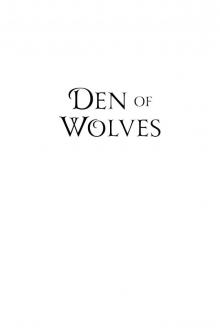 Den of Wolves
Den of Wolves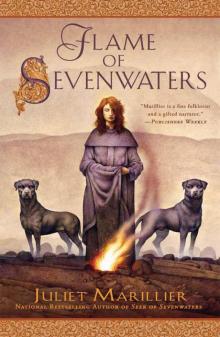 Flame of Sevenwaters
Flame of Sevenwaters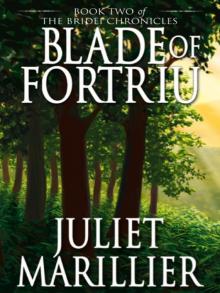 Blade of Fortriu
Blade of Fortriu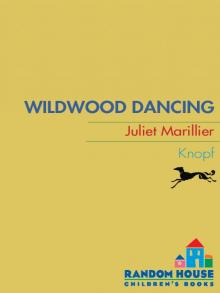 Wildwood Dancing
Wildwood Dancing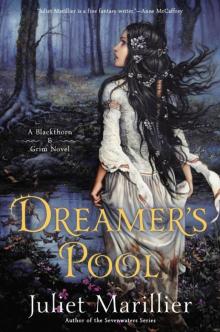 Dreamer's Pool
Dreamer's Pool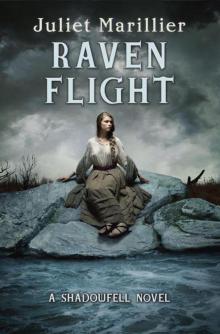 Raven Flight
Raven Flight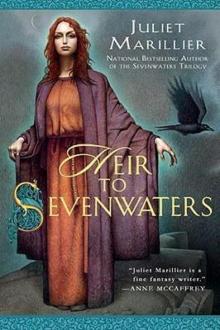 Heir to Sevenwaters
Heir to Sevenwaters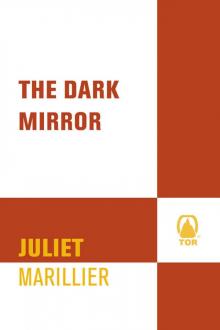 The Dark Mirror
The Dark Mirror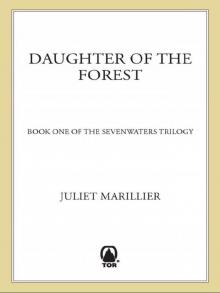 Daughter of the Forest
Daughter of the Forest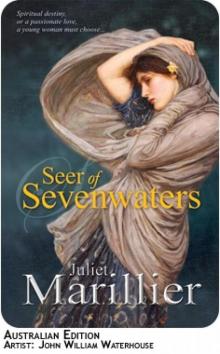 Seer of Sevenwaters
Seer of Sevenwaters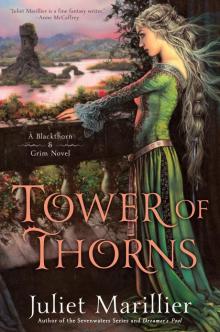 Tower of Thorns
Tower of Thorns Shadowfell
Shadowfell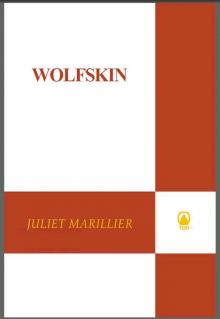 Wolfskin
Wolfskin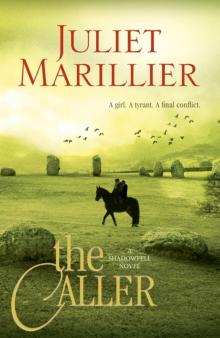 The Caller
The Caller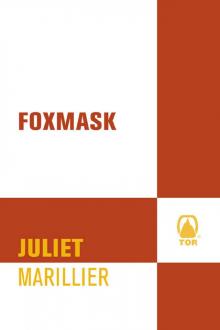 Foxmask
Foxmask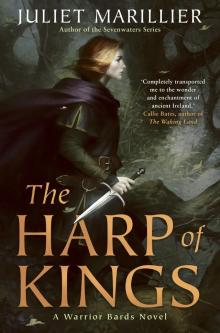 Harp of Kings
Harp of Kings The Well of Shades
The Well of Shades Heart's Blood
Heart's Blood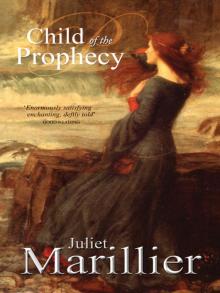 Child of the Prophecy
Child of the Prophecy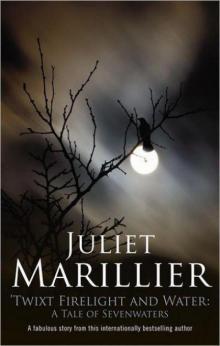 Twixt Firelight and Water
Twixt Firelight and Water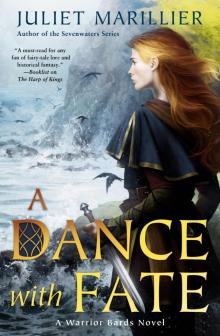 A Dance with Fate
A Dance with Fate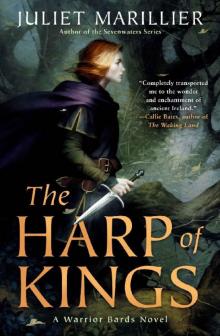 The Harp of Kings (Warrior Bards)
The Harp of Kings (Warrior Bards)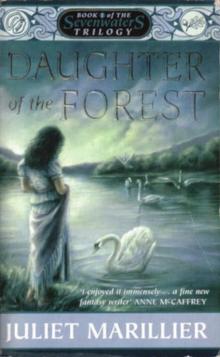 Daughter of the Forest (The Sevenwaters Trilogy)
Daughter of the Forest (The Sevenwaters Trilogy)![Sevenwaters [06] Flame of Sevenwaters Read online](http://i1.bookreadfree.com/i2/04/08/sevenwaters_06_flame_of_sevenwaters_preview.jpg) Sevenwaters [06] Flame of Sevenwaters
Sevenwaters [06] Flame of Sevenwaters![[Sevenwaters 04] Heir to Sevenwaters Read online](http://i1.bookreadfree.com/i2/04/12/sevenwaters_04_heir_to_sevenwaters_preview.jpg) [Sevenwaters 04] Heir to Sevenwaters
[Sevenwaters 04] Heir to Sevenwaters